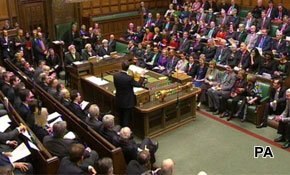Why the low turnout in this week’s police elections is good news - YouGov President, Peter Kellner analyses
Last Tuesday, the day of America’s presidential election, also marked the midpoint in the current Parliament. It is too early to say whether the Government will succeed or fail on the big economic and social issues – growth, welfare and public service reform. But it is not too early to say that its programme to modernise Britain’s constitution is in trouble.
Here’s the checklist so far:
- House of Lords reform – abandoned
- Reducing the size of the House of Commons and equalising constituency electorates – ditched
- A big increase in the number of directly-elected mayors – rejected by the great majority of local referendums
- “Early legislation” to give local voters the power to eject their MPs – stalled
Want to receive Peter Kellner's commentaries by email? Subscribe here
The things that have happened have not really been wanted by the Conservatives: a five-year fixed-term Parliament, and agreement to hold referendums on the Alternative Vote and Scottish independence. (However, the Tories achieved their aim of preventing electoral reform and are also likely to get their way on Scottish independence.)
This week may see the Government’s greatest constitutional humiliation: derisory turnouts in elections throughout England (apart from London) to elect local police chiefs. These were intended not just to give us better-run police forces, but to energise local democracy and attract dedicated people from outside party politics into the world of accountable public service management
YouGov’s latest poll for the Sunday Times shows how little enthusiasm there is for these elections.
- Only 24% of people in areas with elections think directly elected Police and Crime Commissioners will make the police more accountable
- Just 14% think they will lead to better standards of policing
- A mere 10% think the police they will make the police better at fighting crime
- In each case, it’s not that many people think things will get worse – it’s just that they can’t see this loudly proclaimed reform making any difference; which is why…
- Only 28% say they are absolutely certain to vote in these elections.
I wouldn’t be surprised if the actual turnout in many areas is even less. The media are largely ignoring the elections; the Government has not given candidates a free mailshot to every elector (of the kind that parliamentary candidates enjoy); and hardly any locally prominent non-party figures have come forward.
Government ministers have conceded the likelihood of a low turnout. They say that once people get to know their locally elected police chief, enthusiasm for the idea will grow and turnout in future elections will rise.
Perhaps. But there is a more basic issue to consider. Until the 1970s, Britain was a representative democracy. Apart from the anomaly of the House of Lords, we elected politicians to take decisions on our behalf, locally and nationally. Executive politicians, from council leaders to the Prime Minister, were the leaders of the parties that won elections. If they failed, voters knew who to blame, and could eject them at the next election.
In the past 40 years, a series of tactical responses to short-term headaches have chipped away at the foundations of this system. Referendums have diminished the power of Parliament and local councils. Directly-elected mayors have muddied the waters of local accountability. This week’s elections of Police and Crime Commissioners will do the same. When things go wrong – as they are always prone to do with any human institution – we can now expect a ferocious game of pass-the-parcel, with every key player saying that they would have got it right if only they had more power or money or freedom to bypass their pesky opponents. To some extent that kind of tension has always been present between local and national government; now, the tensions will multiply.
But those tensions will in turn be symptoms of a deeper issue that nobody, least of all ministers, is really addressing: by what basic principles are they seeking to revise our democratic arrangements? In March 1975 Margaret Thatcher, then the newly elected leader of the Conservative Party, delivered a major speech in the House of Commons opposing the then Labour government’s bill to hold a referendum on Europe. It is one of the finest defences of representative democracy speeches that any major politician has ever mounted. The Thatcher Foundation has done a great service in placing it on their website. (The speech is also relevant to today’s arguments about whether to hold a referendum on Britain’s future links with the rest of Europe; but that’s another story.)
I would challenge any front-bench MP, from any of the main parties, to make as cogent and rigorous speech today about the basic character of today’s British democracy: whether they still support the representative principle, and by what consistent criteria they would qualify it. There may be a coherent case to be made for the patchwork arrangements that are now springing up; but I have yet to hear it. In voting down the idea of elected mayors so widely, and by turning their back on this week’s police elections in such vast numbers, the people seem to have understood far better than the politicians how unattractive that patchwork is.
Want to receive Peter Kellner's commentaries by email? Subscribe here










